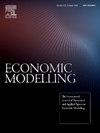Transfers or subsidies? Comparing mitigation strategies for energy price shocks in a production network model
IF 4.7
2区 经济学
Q1 ECONOMICS
引用次数: 0
Abstract
The dependency on imported essential production inputs poses a threat of abrupt price hikes and shortages, potentially triggered by political events. The energy crisis resulting from the Russian war of aggression is an example. Using a dynamic multi-sector economic model that is calibrated to Germany and incorporates endogenous firm entry and exit, this study investigates whether governments should bolster production via transfers or cost subsidies in the event of a crisis. Findings suggest that subsidizing production costs is more beneficial for economic activity and welfare, provided the energy demand due to the subsidy does not significantly influence the price of the essential production input. If it does, this approach could become exceedingly expensive. In such scenarios, it is economically more efficient to provide lump-sum transfers to firms. The effectiveness of these policies ultimately hinges on their impact on the price of the imported input.
转移支付还是补贴?比较生产网络模型中能源价格冲击的缓解策略
对进口基本生产投入的依赖构成了价格突然上涨和短缺的威胁,这可能由政治事件引发。俄罗斯侵略战争导致的能源危机就是一个例子。本研究使用了一个动态的多部门经济模型,该模型以德国为例进行了校准,并纳入了内生的企业进入和退出,研究了在危机情况下政府是否应该通过转移或成本补贴来促进生产。研究结果表明,在补贴导致的能源需求不显著影响基本生产投入价格的情况下,补贴生产成本对经济活动和福利更有利。如果是这样,这种方法可能会变得非常昂贵。在这种情况下,向企业提供一次性转移支付在经济上更为有效。这些政策的有效性最终取决于它们对进口投入价格的影响。
本文章由计算机程序翻译,如有差异,请以英文原文为准。
求助全文
约1分钟内获得全文
求助全文
来源期刊

Economic Modelling
ECONOMICS-
CiteScore
8.00
自引率
10.60%
发文量
295
期刊介绍:
Economic Modelling fills a major gap in the economics literature, providing a single source of both theoretical and applied papers on economic modelling. The journal prime objective is to provide an international review of the state-of-the-art in economic modelling. Economic Modelling publishes the complete versions of many large-scale models of industrially advanced economies which have been developed for policy analysis. Examples are the Bank of England Model and the US Federal Reserve Board Model which had hitherto been unpublished. As individual models are revised and updated, the journal publishes subsequent papers dealing with these revisions, so keeping its readers as up to date as possible.
 求助内容:
求助内容: 应助结果提醒方式:
应助结果提醒方式:


